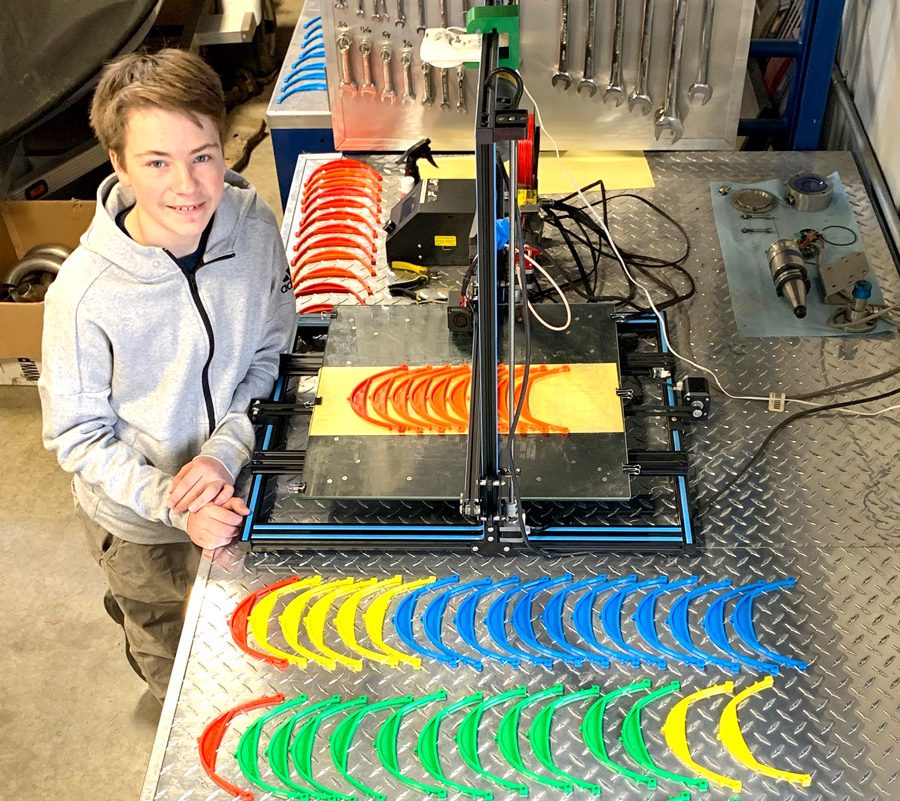GUELPH – The Upper Grand District School Board 3D Printing team received an Everyday Hero Award for project “Op Shield.”
The team, consisting of students and staff throughout Wellington County, Guelph and Dufferin County, created “Op Shield” and spent the spring printing 3D face shields for frontline workers during the COVID-19 pandemic.
The project began in mid-March when schools were closed after March break and no one knew much about the pandemic.
SHSM/technological education curriculum lead Charles Benyair said he was watching the news one night and saw that there was a PPE (personal protective equipment) shortage around the country.
He started making and receiving phone calls and eventually there was a group of about 15 staff and students who wanted to help.
“We decided that we were going to start printing face shields from our 3D printers that we have in the schools,” he said.
“We have an enormous amount, like a huge amount, of 3D printers in our schools.”
In fact, every school has one because the Ministry of Education has supported Upper Grand’s vision over the last 10 years to have technology in every school.
“We were in a perfect position to do this,” Benyair said.
“This wasn’t a problem to do this. The resources were there for sure.”
He said the idea was simple, but the technology was advanced.
What happened was teachers familiar with the printers designed the headpiece for the face shield on the 3D printer and distributed the plan virtually to all team members.
As for the 3D printers, each team member either picked them up at or had them delivered from schools throughout the board. They were set up in their private homes.
Benyair said at any given time there were about 25 printers working. It took about two and a half hours to print five of the head pieces for the shields.
Once completed, an overhead projector clear sheet was affixed to the headpiece as the shield.
Benyair said once they started the project the printers were running almost 24 hours a day and the team was printing about 200 shields daily.
Other teachers and community partners would pick up the finished product and distribute the face shields to hospitals, long-term care homes and anywhere else that needed them.
“We ended up doing 6,000 shields in total from about March to the end of May,” he said. “They were totally free.
“The board absorbed all the costs and paid for it all and we distributed it.”
The project wrapped up in May, when the manufacturing industry caught up and could provide adequate amounts of medically approved equipment to frontline workers.
“We were producing this in a small era that basically was anything will do,” Benyair said.
“The hospitals and retirement homes, they had nothing, absolutely nothing.
“They had run out and there was a little bit of a gap for a few weeks and anything was better than nothing and we were lucky that we identified that early and we had those things ready for when they needed them.”
He said the team will be able to pick up production again if needed, but he hopes that doesn’t happen.
“Everybody just wanted to make sure that we did a good job and got a good product out because the community needed support,” he said.
In addition to Benyair, team members included:
- Rhys Bennett;
- Jason Boyce;
- Michelle Brady;
- Jack Cox;
- Leonard Guchardi;
- Scott Harris;
- Tim Neal;
- Frances Norien;
- Justin Novikow;
- Chris Priester;
- Ruth Tanner;
- Monique Van Item; and
- Breanne Williamson.




